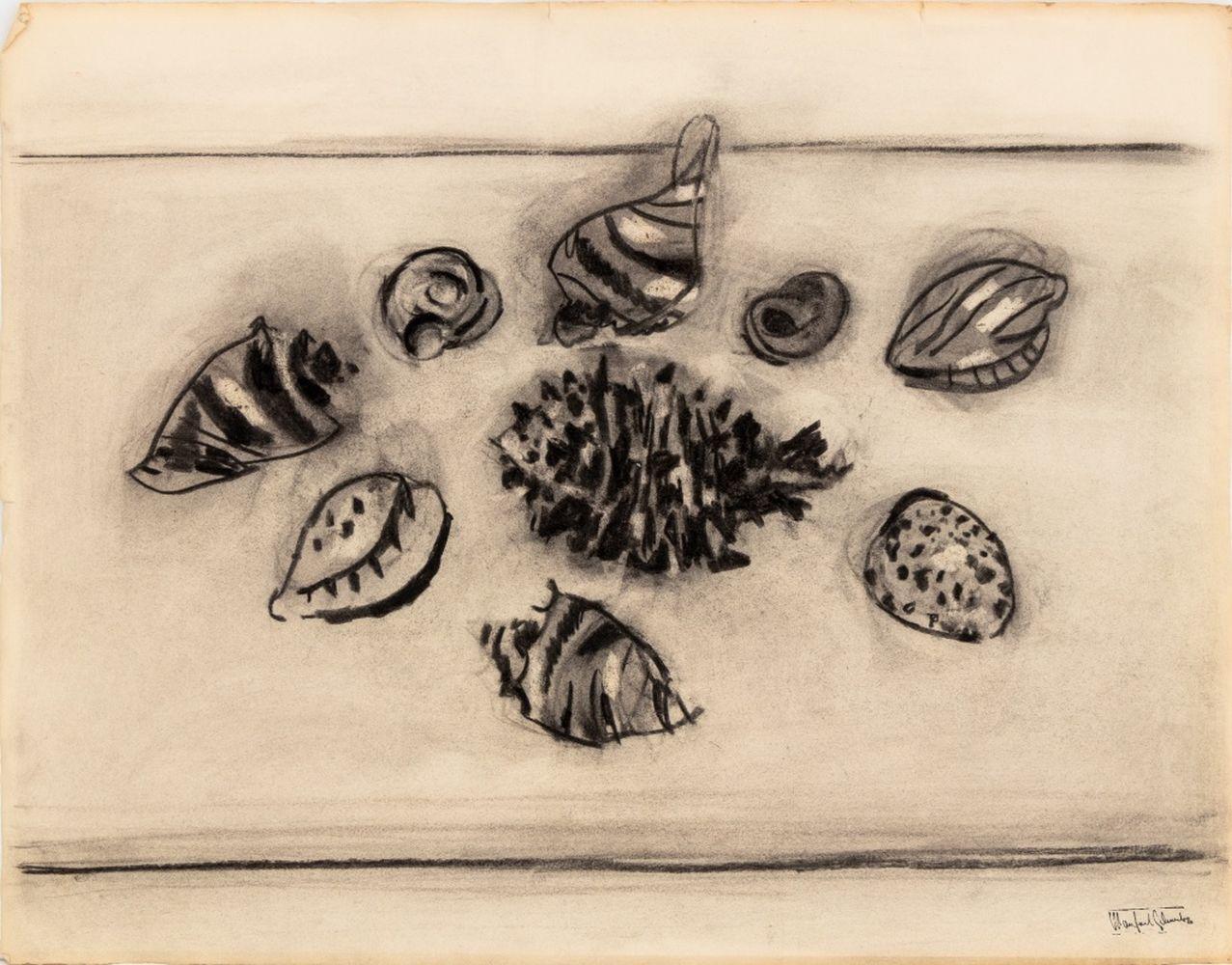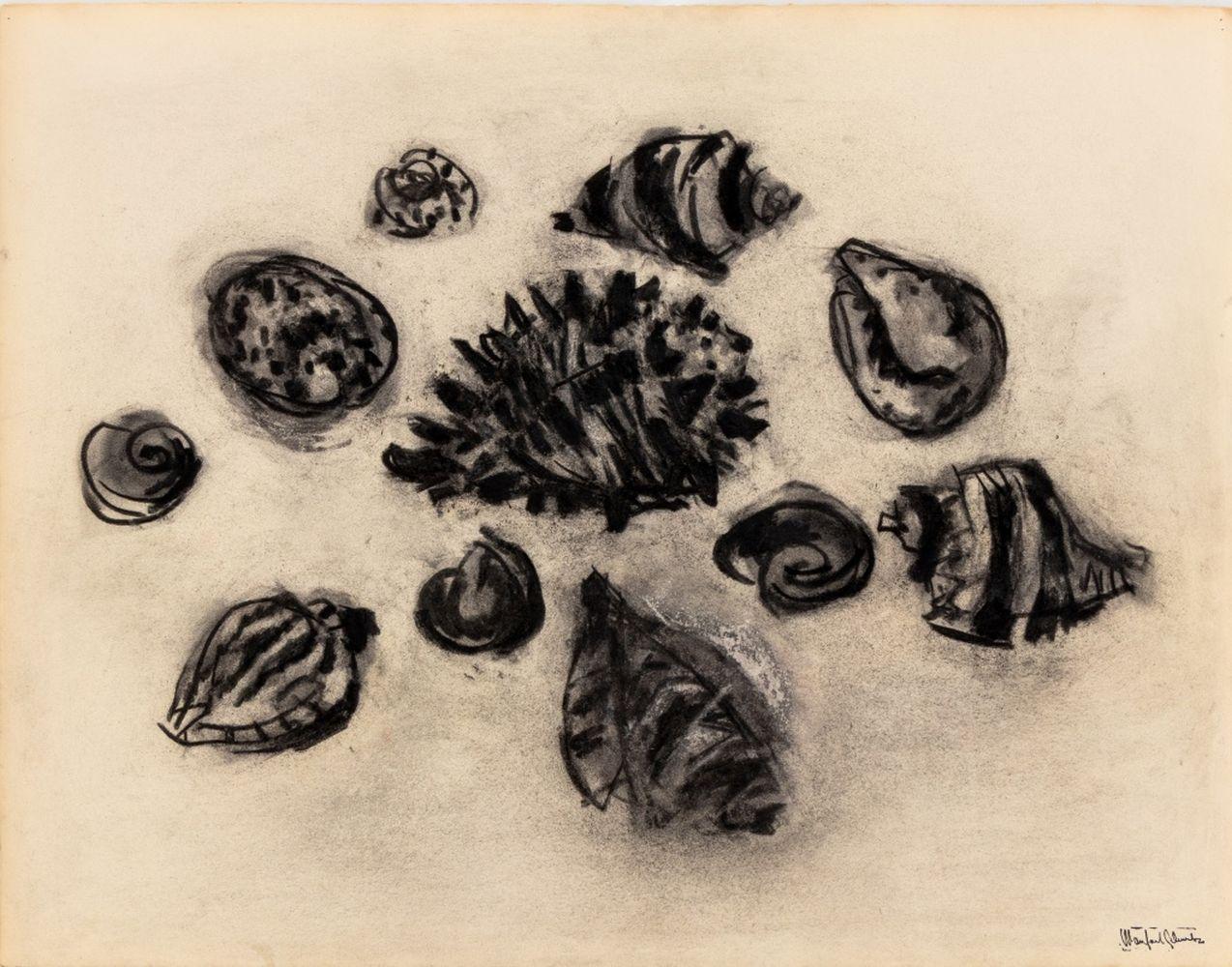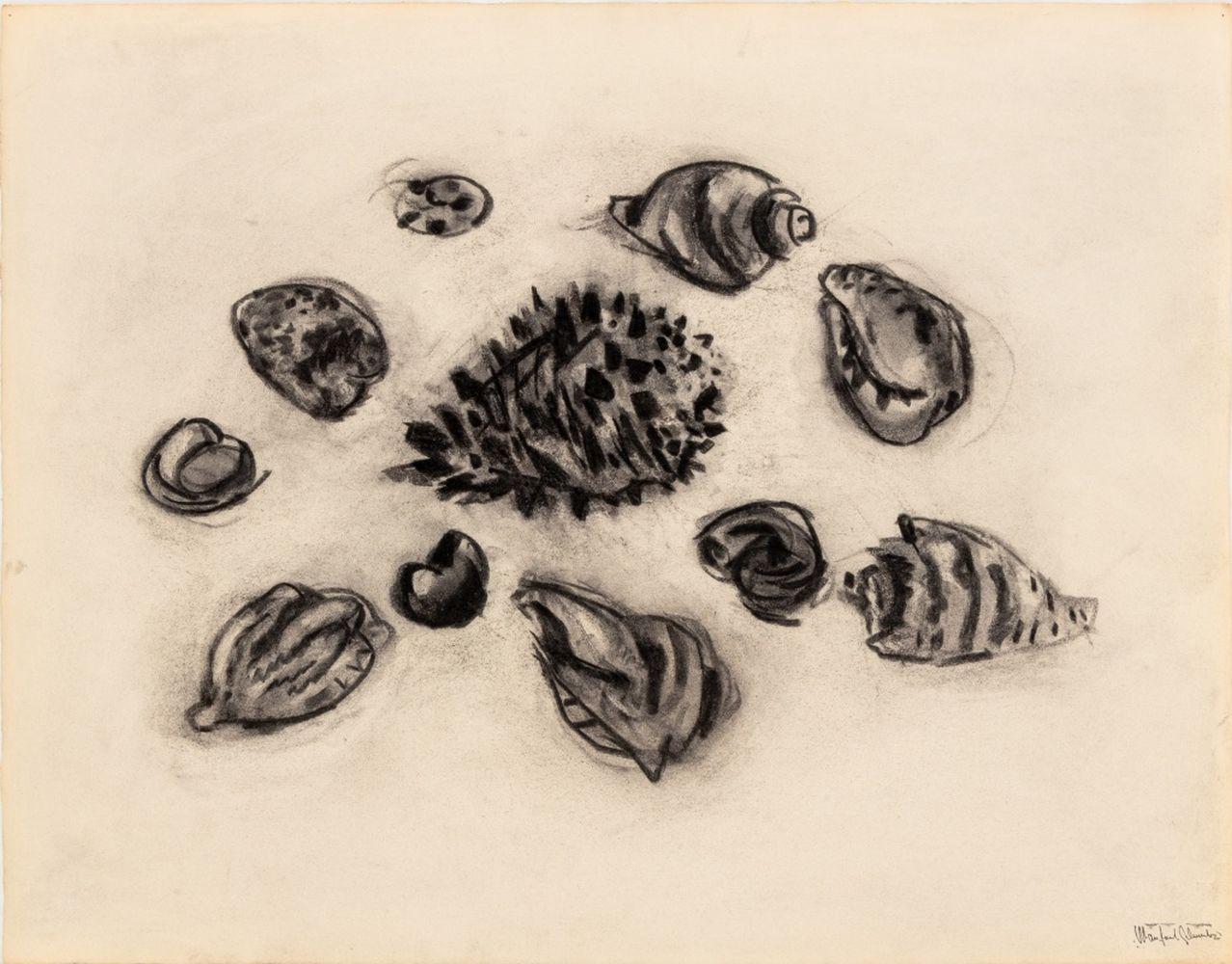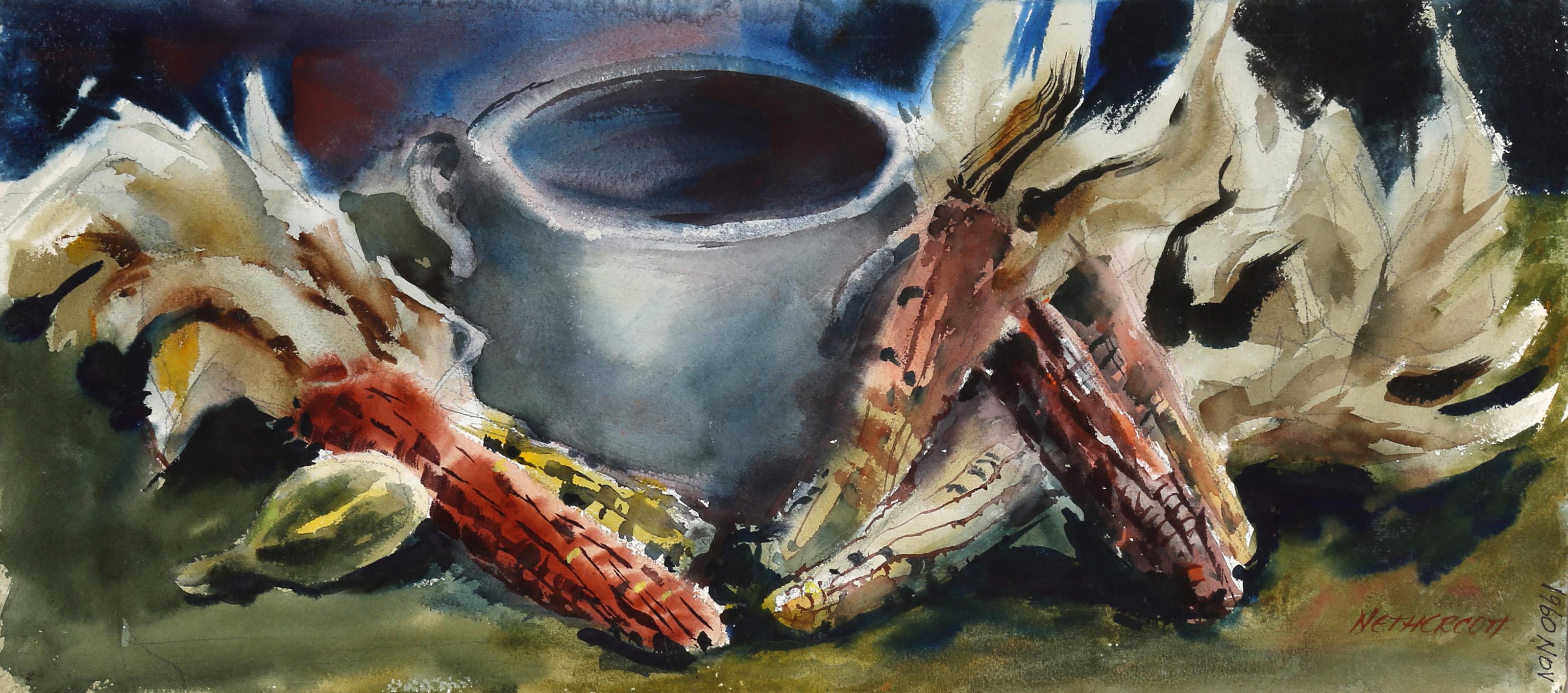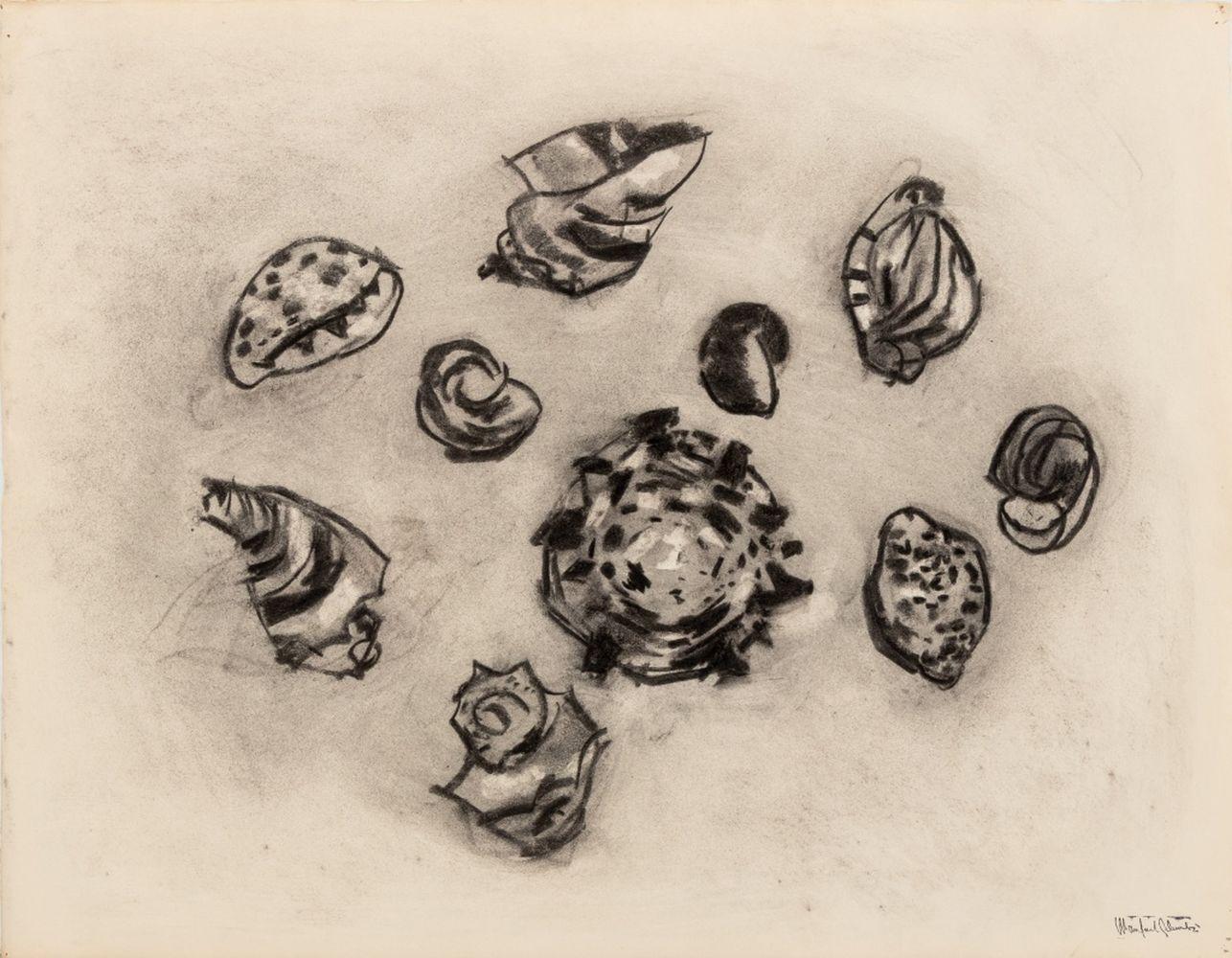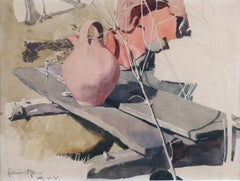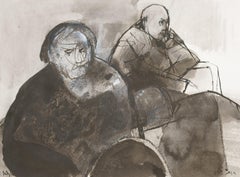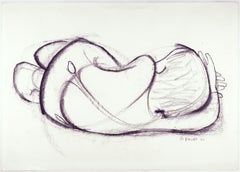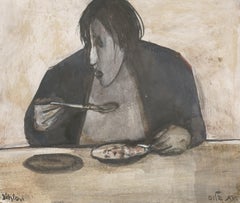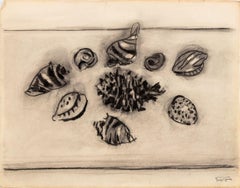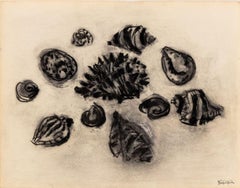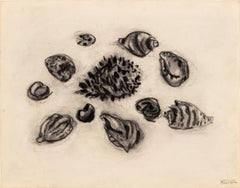Items Similar to Still life with fish bones, pencil and pencil sharpener / - The irony of art -
Want more images or videos?
Request additional images or videos from the seller
1 of 8
Manfred K. SchwitteckStill life with fish bones, pencil and pencil sharpener / - The irony of art -1992
1992
$454.63
$568.2820% Off
£339.92
£424.9020% Off
€384
€48020% Off
CA$636.69
CA$795.8620% Off
A$699.96
A$874.9620% Off
CHF 361.82
CHF 452.2820% Off
MX$8,375.52
MX$10,469.4020% Off
NOK 4,567.93
NOK 5,709.9120% Off
SEK 4,282.56
SEK 5,353.2020% Off
DKK 2,925.29
DKK 3,656.6120% Off
About the Item
Manfred K. Schwitteck (*1948), Still life with fish bones, pencil and pencil sharpener, 1992. watercolor over pencil on handmade paper, 31.5 x 45 cm (visible size), 47 x 61 cm (frame), signed in the center "m. k. schwitteck" and dated "25.8.[19]92", framed in passepartout under glass.
- very well preserved and attractively framed
- The irony of art -
Four remnants of consumed fish are arranged into a kind of fish shape. In the middle of this 'fish body' is a clip, a pencil sharpener and a pencil situated, above it lies a spring onion.
Manfred Schwittek creates here a still life, which has a self-reflexive dimension through the pencil and the pencil sharpener, since the picture was also drawn with the pencil. Yet the pencil is still sharpened and ready for new such creations, just as the onion could also still be prepared. The fish heads peeking out of the picture, on the other hand, are remnants, which, however, from the perspective of being artistically created, do not represent waste or leftovers, but are also something created. The bell is a humorous, as it were giggling accessory that draws attention to the contradiction between waste and art and at the same time seems to be amused by it.
GERMAN VERSION
Manfred K. Schwitteck (*1948), Stillleben mit Fischgräten, Bleistift und Anspitzer, 1992. Aquarell über Bleistift auf Büttenpapier, 31,5 x 45 cm (Sichtmaß), 47 x 61 cm (Rahmen), mittig mit „m. k. schwitteck“ signiert und auf den „25.8.[19]92“ datiert, im Passepartout unter Glas gerahmt.
- sehr gut erhalten und ansprechend gerahmt
- Die Ironie der Kunst -
Vier Überbleibsel verzehrter Fische sind zu einer Art Fischform angeordnet. Inmitten dieses ‚Fischkörpers‘ ist eine Schelle, ein Anspitzer und ein Bleistift situiert, darüber liegt eine Frühlingszwiebel.
Manfred Schwittek schafft hier ein Stillleben, das durch den Bleistift und den Anspitzer eine selbstreflexive Dimension aufweist, da das Bild auch mit dem Bleistift gezeichnet worden ist. Dabei ist der Bleistift noch gespitzt und zu neuen derartigen Kreationen bereit, so wie die Zwiebel ebenfalls noch zubereitet werden könnte. Die aus dem Bild herausblickenden Fischköpfe sind hingegen Überbleibsel, die unter der Perspektive des künstlerischen Geschaffen-Seins jedoch keinen Abfall oder Rest darstellen, sondern ebenfalls etwas Geschaffenes sind. Die Schelle ist ein humorvolles, gleichsam kicherndes Accessoire, das auf den Widerspruch zwischen Abfall und Kunst aufmerksam macht und sich zugleich darüber zu amüsieren scheint.
- Creator:Manfred K. Schwitteck (1948, German)
- Creation Year:1992
- Dimensions:Height: 18.51 in (47 cm)Width: 24.02 in (61 cm)Depth: 0.79 in (2 cm)
- Medium:
- Movement & Style:
- Period:
- Condition:
- Gallery Location:Berlin, DE
- Reference Number:1stDibs: LU2438212429292
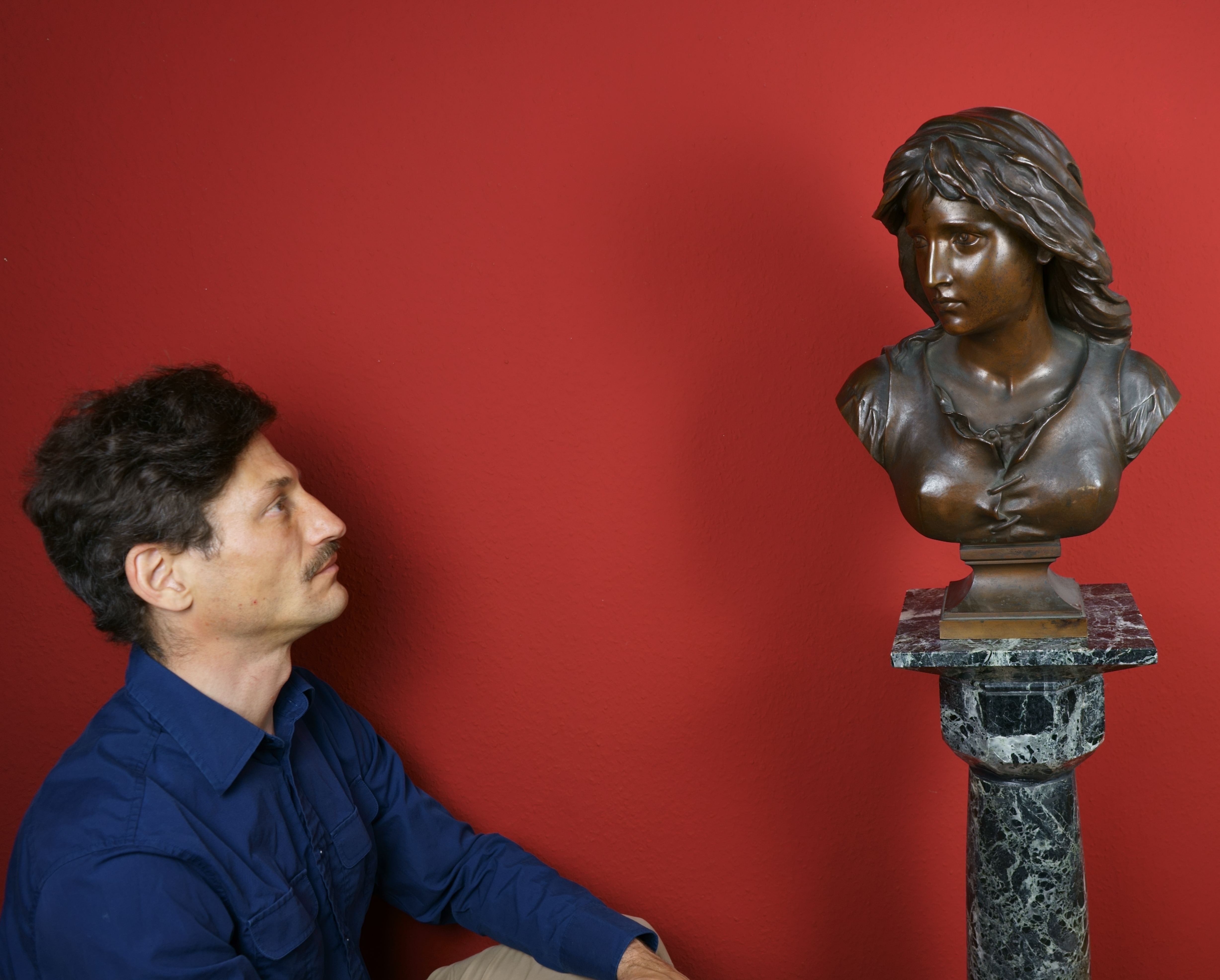
About the Seller
5.0
Vetted Professional Seller
Every seller passes strict standards for authenticity and reliability
Established in 2014
1stDibs seller since 2023
21 sales on 1stDibs
- ShippingRetrieving quote...Shipping from: Berlin, Germany
- Return Policy
Authenticity Guarantee
In the unlikely event there’s an issue with an item’s authenticity, contact us within 1 year for a full refund. DetailsMoney-Back Guarantee
If your item is not as described, is damaged in transit, or does not arrive, contact us within 7 days for a full refund. Details24-Hour Cancellation
You have a 24-hour grace period in which to reconsider your purchase, with no questions asked.Vetted Professional Sellers
Our world-class sellers must adhere to strict standards for service and quality, maintaining the integrity of our listings.Price-Match Guarantee
If you find that a seller listed the same item for a lower price elsewhere, we’ll match it.Trusted Global Delivery
Our best-in-class carrier network provides specialized shipping options worldwide, including custom delivery.More From This Seller
View AllClay jug on a bench - The essence of the clay jar revealed by the sunlight -
By Hans Richard von Volkmann
Located in Berlin, DE
Hans Richard von Volkmann (1860 Halle (Saale) - 1927 ibid.), Clay jug on a bench. Pencil and Watercolour on paper. 20 x 26,7 cm (visible size), 37 x 45 cm (frame), dated and monogrammed lower left "Februar 1890 - HR. V. V."
- Minimally tanned. Framed behind glass in a passepartout.
About the artwork
Using the technique of his early youth - pencil and watercolour - Hans Richard von Volkmann depicts a still life. However, this is not a conventional indoor still life, but an open-air depiction, painted outdoors and not in the studio. It is therefore an open-air painting, characteristic of von Volkmann's oeuvre, which could have been painted in the Willingshausen colony of painters, where open-air painting was programmatically practised there and the artist stayed there that year.
And indeed, this painting is a manifesto of open-air painting. Von Volkmann demonstrates that leaving the studio for the light of nature leads to an entirely new quality of art. To prove this, he uses the genre of still life, which can be described as the studio subject par excellence. Moreover, light plays an essential role in the classical still life. It is the real protagonist of the still life. And it is precisely this moment, essential to the still life, that von Volkmann exploits to demonstrate the potential of plein-air painting: He presents the objects as they appear in the sunlight. The date of February and the bare branches in the foreground make it clear that this is a clear winter day in bright sunlight. The delicate plant in the foreground casts a clearly defined shadow, as does the jug. However, the shadow is most pronounced on the jug itself: The underside of the handle appears almost black, making the top, and therefore the jug itself, shine all the more brightly. The shining of the objects in the sunlight is also visible on the bench. As complementary phenomena to the shadow zones, light edges can be seen on the boards of the seats and the upper foot of the bench shines entirely in the light. To achieve this intensity of light, von Volkmann activated the bright white of the painting ground.
By depicting the objects in glistening sunlight, von Volkmann demonstrates that this quality of light is only to be found outdoors. And this light leads to a new way of looking at the objects themselves. The jug on the bench seems like an accidental arrangement, as if the artist had stumbled upon this unintentional still life and captured it with fascination. And in this fascination there is a moment of realisation that refers to the objects themselves. It is only when they shine brightly in the sunlight that their true nature is revealed. In this way, sunlight allows the objects to come into their own, so to speak. Sunlight, which is not present in the studio, gives the still life an entirely new dimension of reality, which is also reflected in the colours interwoven by the sunlight: The bench and the jug stand in a harmonious grey-pink contrast to the green of the implied meadow.
The emphasis on the jug as the central subject of the picture also implies that the watercolour has not been completed. This non finito inscribes a processuality into the picture, making it clear that something processual has been depicted, the temporality of which has been made artistically permanent. This is why von Volkmann signed the painting and dated it to the month.
About the Artist
Von Volkmann made his first artistic attempts at the age of 14. He painted many watercolours of his home town of Halle. This laid the foundation for his later outdoor painting.
In 1880 his autodidactic beginnings were professionalised with his admission to the Düsseldorf Art Academy. There he studied under Hugo Crola, Heinrich Lauenstein, Johann Peter Theodor Janssen and Eduard von Gebhardt until 1888. Von Volkmann then moved to the Karlsruhe Academy, where he was Gustav Schönleber's master pupil until 1892.
In 1883 he came for the first time to Willingshausen, Germany's oldest painters' colony, at the suggestion of his student friend Adolf Lins...
Category
1890s Naturalistic Still-life Drawings and Watercolors
Materials
Watercolor
Two sitting old people / - Familiar Strangeness -
By Ruth Schloss
Located in Berlin, DE
Ruth Schloss (1922 Nuremberg - 2013 Kfar Shmaryahu), Two sitting old people, around 1990. Mixed media on watercolor paper, 24 cm x 32 cm, signed “Schloss” lower left and again in Heb...
Category
1990s Realist Figurative Drawings and Watercolors
Materials
Paper
Lying Boy / - Fragile childlikeness -
Located in Berlin, DE
Alfred Fuchs (1925 Saarbrücken - 2003 Prague), Lying Boy. Charcoal drawing on strong paper, 30 x 41.5 cm, signed A.[lfred] Fuchs and dated [19]96.
- smal...
Category
1990s Realist Figurative Drawings and Watercolors
Materials
Charcoal
$520 Sale Price
20% Off
Woman eating / - Interior Pictures -
By Ruth Schloss
Located in Berlin, DE
Ruth Schloss (1922 Nuremberg - 2013 Kfar Shmaryahu), Woman eating, around 1990. Mixed media on watercolor paper, 22.2 cm x 26.5 cm, signed “Schloss” lower left and signed again in He...
Category
1990s Realist Figurative Drawings and Watercolors
Materials
Paper
Figurative Composition / - Expressive Signs -
Located in Berlin, DE
Max Neumann (* 1949 Saarbrücken) and Eta Bender (*1948 Heidelberg), Figurative Composition, around 1970. Mixed media on tracing paper, mounted on thin backing paper, 29.6 cm x 21 cm,...
Category
1970s Abstract Expressionist Figurative Drawings and Watercolors
Materials
Paper
Contemplating old man / - The View into Life -
By Ruth Schloss
Located in Berlin, DE
Ruth Schloss (1922 Nuremberg - 2013 Kfar Shmaryahu), Contemplating old man, around 1990. Mixed media on watercolor paper, 33 cm x 40 cm, signed “Schloss” lower left and again in Hebr...
Category
1990s Realist Figurative Drawings and Watercolors
Materials
Paper
You May Also Like
Still Life of Seashells
By Manfred Schwartz
Located in Astoria, NY
Manfred Schwartz (American, b. Poland, 1909-1970), Still Life of Seashells, Charcoal on Paper, with the artist's signature stamped lower right, unframed. 20" H x 25.75" W. Provenance...
Category
Mid-20th Century Modern Still-life Drawings and Watercolors
Materials
Paper, Charcoal
Still Life with eelpout. 1979, watercolor on paper, 75x55 cm
Located in Riga, LV
Still Life with eelpout. 1979, watercolor on paper, 75x55 cm
Jekabs Arturs Springis
(1907– 2004) Painter, Latvia
1924 – 1927 – he learned at Aizpute Secondary School
1927 – 1930 ...
Category
1970s Impressionist Still-life Drawings and Watercolors
Materials
Paper, Watercolor
$1,136 Sale Price
20% Off
Still Life of Seashells
By Manfred Schwartz
Located in Astoria, NY
Manfred Schwartz (American, b. Poland, 1909-1970), Still Life of Seashells, Charcoal on Paper, with the artist's signature stamped lower right, unframed. 20" H x 25.75" W. Provenance...
Category
Mid-20th Century Modern Still-life Drawings and Watercolors
Materials
Paper, Charcoal
Still Life of Seashells
By Manfred Schwartz
Located in Astoria, NY
Manfred Schwartz (American, b. Poland, 1909-1970), Still Life of Seashells, Charcoal on Paper, with the artist's signature stamped lower right, unframed. 20" H x 25.75" W. Provenance...
Category
Mid-20th Century Modern Still-life Drawings and Watercolors
Materials
Paper, Charcoal
Still Life with Corn, Impressionist Watercolor by Eve Nethercott
By Eve Nethercott
Located in Long Island City, NY
Eve Nethercott, American (1925 - 2015) - Still Life with Corn (P6.31), Year: 1960, Medium: Watercolor on Paper, Size: 10 x 22 in. (25.4 x 55.88 cm), Printer: , Description: R...
Category
1960s Impressionist Still-life Drawings and Watercolors
Materials
Watercolor
Still Life of Seashells
By Manfred Schwartz
Located in Astoria, NY
Manfred Schwartz (American, b. Poland, 1909-1970), Still Life of Seashells, Charcoal on Paper, with the artist's signature stamped lower right, unframed. 20" H x 25.5" W. Provenance:...
Category
Mid-20th Century Modern Still-life Drawings and Watercolors
Materials
Paper, Charcoal
More Ways To Browse
Painting Of Fish
Fish Head
Still Life With Fish
Fish Bone
Fish Etching
Pencil Sharpener Vintage
Charcoal Drawing Flowers
Chinese Still Life Watercolors
Edward Ridley
Jose Ramos
Raoul Dufy Ferier
Antique Jar Drawing
Babette Eddleston
Andy Warhol Shoe Drawings
Claus Hoie
Helen Hoie
Paul De Longpre Paintings
Rosalind Oesterle
